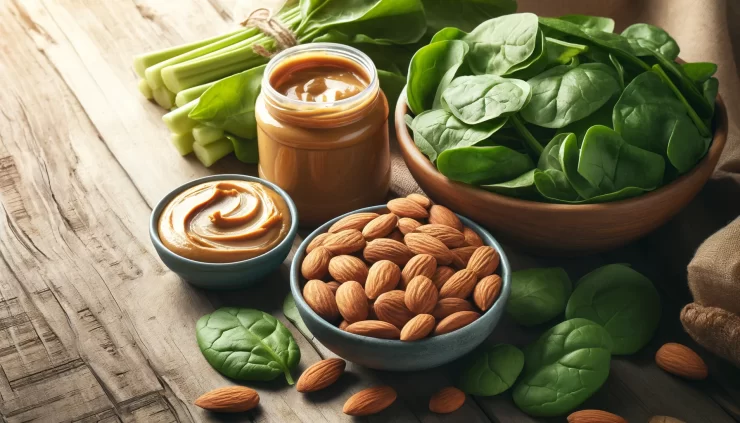If you’ve come to believe that peanut butter, almonds, and spinach are always good for you, today’s discussion might surprise you. These three commonly acclaimed health foods could actually be contributing to health problems. Let’s delve into why these foods might not be as beneficial as you think.
- Peanut Butter
Peanut butter is often celebrated for its protein content and its vitamins and minerals. However, the negatives might outweigh the positives. Peanuts have one of the highest concentrations of aflatoxin, a mold toxin that forms when peanuts are stored in moist conditions. This toxin is associated with various health risks, including liver damage.
Moreover, peanut butter is rich in omega-6 fatty acids, which, in excess, can be inflammatory. Most peanut butter is also processed in a way that oxidizes these fats, making them harmful. Given that many diets are already high in omega-6 fats from sources like soy, corn, and canola oils, additional intake from peanut butter can contribute to insulin resistance, heart disease, brain inflammation, cancer, and other health issues.
Additionally, peanut butter contains moderate amounts of oxalates, which are plant-based compounds that can contribute to kidney stones, thyroid issues, and joint problems when consumed in excess.
- Spinach
Spinach is often touted as a superfood due to its nutrient content. However, it also contains very high levels of oxalates—one of the highest among commonly consumed vegetables. A typical serving can contain up to 600 mg of oxalates. Renowned expert Sally Norton suggests that a “safe” daily intake is between 100-200 mg to avoid health complications.
The high oxalate content in spinach can lead to serious health issues like kidney stones, thyroid dysfunction, gut damage, and joint pain. There have been reports of individuals experiencing “oxalate poisoning” from consuming too many green smoothies, leading to emergency room visits for kidney failure.
- Almonds
Like peanut butter and spinach, almonds are often included in health-conscious diets. However, they share similar drawbacks. Almonds are high in omega-6 fats, which can contribute to inflammation when not balanced with omega-3 fats. They also have a significant oxalate content, which poses the same risks as those associated with excessive spinach consumption.
While almonds and almond milk might be marketed as heart-healthy options, their high oxalate and omega-6 fat content can make them less favorable. They may be fine in moderation, but frequent consumption might be worth reconsidering, especially for those with specific health concerns.
In conclusion, while peanut butter, spinach, and almonds do offer nutritional benefits, their potential drawbacks should not be overlooked, especially if you are prone to or are managing specific health issues. As with all foods, moderation and a balanced diet are key to maintaining good health.
Bananas vs oranges vs apples… (the #1 WORST fruit for your gut & energy)
According to the best-selling author and world-renowned heart surgeon, Dr. Steven Gundry, there’s one fruit people over 40 should never eat.
This fruit can damage your gut and disrupt your hormones. Both sapping you of energy and forcing your body to create “sticky” fat cells that can NOT be “burned off” with normal diet and exercise.
Do you know the fruit I’m talking about? Make sure you do by clicking the one below you think it is, and get the answer from Dr. Gundry himself on the next page:
=>Bananas
=> Oranges
=> Apples
=> Grapes












